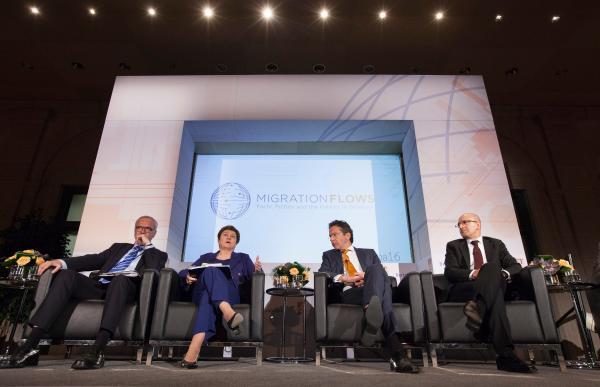
Werner Hoyer, President of the European Investment Bank (EIB), Kristalina Georgieva, Jeroen Dijsselbloem, Dutch Minister for Finance and President of the Eurogroup, and Mehmet Şimşek, Turkish Deputy Prime Minister (from left to right)
Speaking during a high-level panel at the 8th Annual Bertelsmann Foundation – Financial Times Conference entitled Migration Flows: facts, fiction and the politics in between EIB President, Werner Hoyer urged participants to take a holistic view on the current refugee crisis in Europe, seeing it as part of a more general and longer-term global migration challenge.
The President of the EU bank stated that the Multilateral Development Banks and their local partner banks must invest in destination countries, transit countries and countries of origin. He laid out the value and impact of investment when combined with European grants and private sector investment.
“The problem for institutions like ours - and we are the most exposed in the MENA area – is that we need projects which are economically sustainable and bankable to finance. Sometimes this means that we have to make them more sustainable and bankable. This requires a more intelligent use of budgetary funds. We are talking about a paradigm shift in development policies from grants to financial instruments in order to have a larger impact on development goals”. Within the coming years, President Hoyer stated that a financial model parallel to the Investment Plan for Europe could provide one such solution for countries outside the European Union.
President Hoyer finished his intervention with a call for immediate action: “For all the integration challenges we have to meet there is one headline – speed is of the essence. When it comes to integration, we have accelerate. All the way to Molenbeek and to the banlieux of Paris. We must not let people remain concentrated in ghettos. We must ensure that integration begins with entry into the labour markets. With the recognition of their diplomas. And we should not wait for 18 months until their asylum application is processed.”
President Hoyer was speaking alongside Jeroen Dijsselbloem, President of the Eurogroup and Minister of Finance of the Netherlands; Kristalina Georgieva, EU Commissioner for Budget and Human Resources; Mehmet Şimşek, Deputy Prime Minister of the Republic of Turkey and Jason Furman, Chairman of White House Council of Economic Advisers.